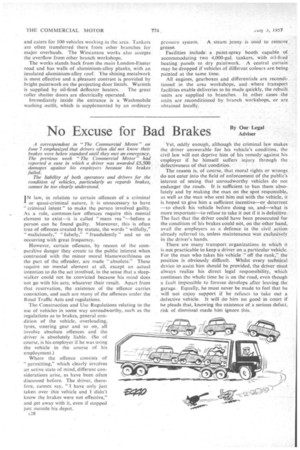No Excuse for Bad Brakes
Page 66

If you've noticed an error in this article please click here to report it so we can fix it.
A correspondent in "The Commercial Motor" on June 7 emphasized that drivers often did not know their brakes were below standard until they met an emergency. The previous week "The Commercial Motor" had reported a case in which a driver was awarded £5,500 damages against his employers because his brakes failed.
The liability of both operators and drivers for the condition of vehicles, particularly as regards brakes, cannot be too clearly understood.
TN law, in relation to certain offence§ of a criminal I or quasi-criminal nature, it is unnecessary to have "criminal intent" to make the person involved guilty. As a ride, common-law offences require this mental element •to exist—it is called " nnens rea "—before a person can be found guilty. Moreover, this is often true of offences created by statute, the words "wilfully," " maliciously," "falsely," " fraudulently " and so on occurring with great 'frequency.
However, certain offences, by reason of the cornparittive danger they create to the public interest when contrasted with the minor moral blameworthiness on the part of the offender, are made "absolute." These require no mental element at all, except an actual intention to do the act involved, in the sense that a sleepWalker could not be convicted because his mind does not go with his. acts, whatever their result. Apart from that reservation, the existence of the offence carries conviction, arid such are many of the offences under the Road Traffic Acts and regulations.
The Construction and Use Regulations relating to the use of vehicles in some way unroadworthy, such as the regulations as to brakes, general condition of the vehicle, overloading, tyres, steering gear and so on, all involve absolute offences and the driver is absolutely liable. (So of course, is his employer if he was using the vehicle in the course of his employment.)
Where the offence consists of "permitting," which clearly involves art active state of mind, different considerations arise, as have been often discussed before. The driver, therefore, cannot say, "I have only just taken over this vehicle and I didn't know the brakes were not effective," and get away with it, even if stopped just outside his depot.
c28 Yet, oddly enough, although the criminal law makes the driver answerable for his vehicle's condition, the civil law will not deprive him of his remedy against his employer if he himself suffers injury through the defectiveness Of that condition.
The reason is, of course, that moral rights or wrongs do not enter into the field of enforcement of the public's interest of seeing that unroadworthy vehicles do not endanger the roads. It is sufficient to ban them absolutely and by making the man on the spot responsible, as well as the man who sent him out with the vehicle, it is hoped to give him a sufficient incentive—or deterrent —to check his vehicle before doing so, and—what is more important—to refuse to take it out if it is defective. The fact that the driver could have been prosecuted for the condition of his brakes could not, on the other hand, avail the employers as a defence in the civil action already referred to, unless maintenance was exclusively in the driver's hands.
. There are many transport organizations in which it is not practicable to keep a driver on a particular vehicle. For the man who takes his vehicle "off the rank," the position is obviously, difficult. Whilst every technical device to assist him should be provided, the driver must always realize his direct legal responsibility, which continues the whole time he is on the road, even though a fault impossible to foresee develops after leaving the garage. Equally, he must never be made to feel that he will not enjoy support if he refuses to 'take out a .defective vehicle. It will do him no good in court if he pleads that, knowing the existence of a serious defect. risk of dismissal made him ignore this.












































































































